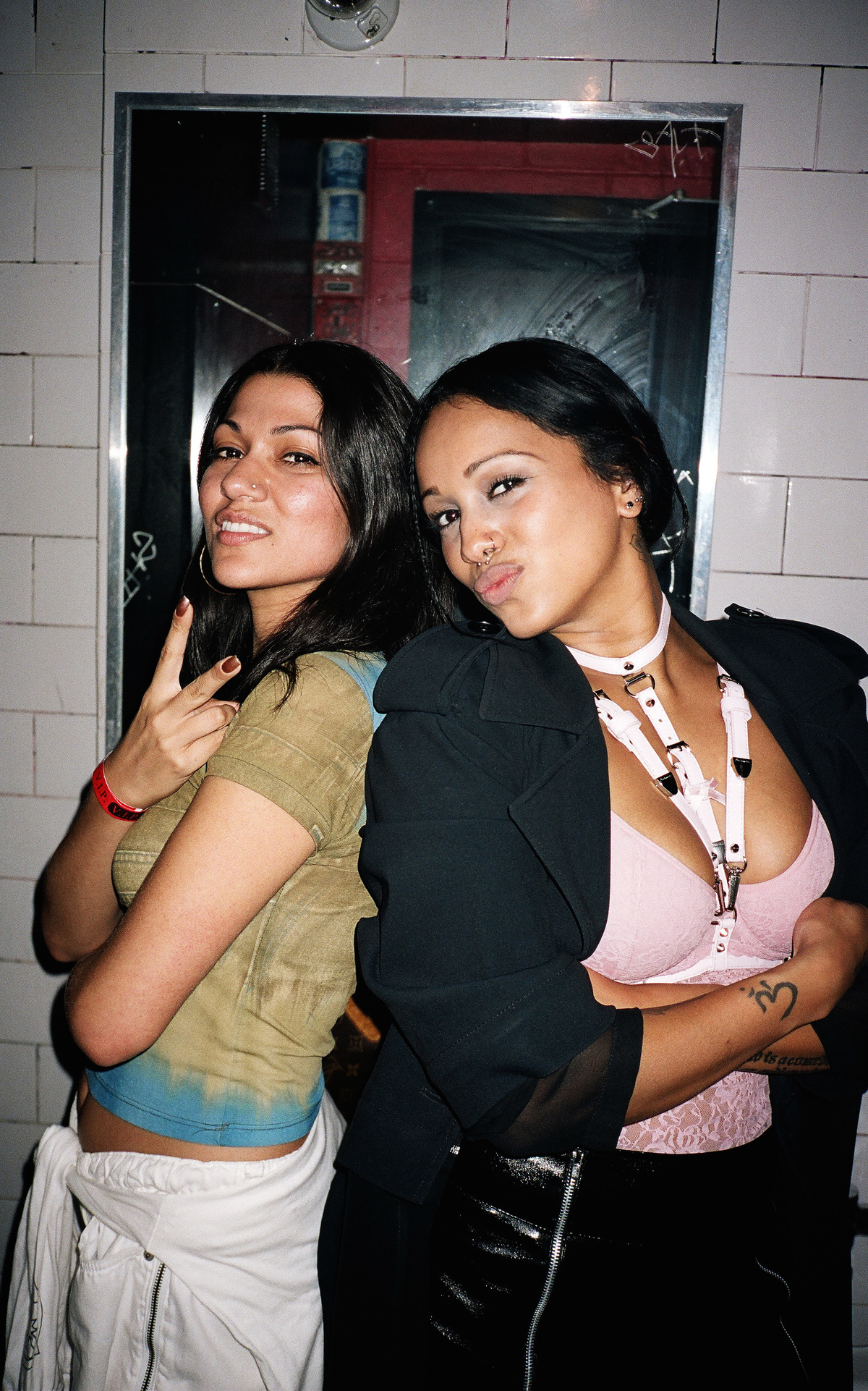How did GHE20G0TH1K get started?
Venus: GHE20G0TH1K started in 2009 as a small bar night that kept evolving from Punk and Hip Hop to different interpretations of what it meant to be “dark.” It was a place where you could listen to types of raw and experimental music that are now popular and trendy but then weren’t as embraced. The party was kind of New York’s version of apocalyptic fun. If the world ends tomorrow, how do we make tonight the most fun night ever?
Asma: It really did feel like that!
V: It did! That was the point of the party – to have A LOT of fun! To just have no rules and operate in total darkness so people could feel free to be whoever they wanted.
So how did you guys meet?
A: We definitely talked on the internet for a while, but we met in the physical when Nguzunguzu played GHE20G0TH1K in 2010.
V: Since then, we’ve collaborated on many events. We’ve made many amazing moments.
A: And we hope to collaborate on music soon!
Have you faced any adversity as women in a relatively male dominated field?
V: Boys are very territorial. I don’t even produce yet and I feel as though that has a lot to do with the lack of female producers and DJs. There aren’t a lot of examples for us to look up to or girls for us to work with or alongside. It’s definitely been a little bit challenging just getting over that obstacle in my mind. People are always like, “Oh you’re a girl that DJs? You’re a girl that wants to make beats? Well, you better be good.”
A: Or you just get put in a box. You become a “girl DJ” rather than being able to sit up top with the boys. It’s definitely a struggle, but at the same time it’s really exciting to hear what females make. I’m in a duo with a man and people constantly ask me if I’m the singer. That’s what people immediately go to as a female figure in music. With electronic music, women can create outside of that role. I’m excited for the future where more and more women come out and are like banging on drum machines, not saying a word. We’re communicating through that as well.
How do you feel social media factors into what it means to be a woman in today’s music industry?
A: The negative side of social media is that it can distract from what you’re actually making. It becomes all about your image, what you’re wearing, who you’re with. I know it’s a part of the game, but reducing things to hashtags really waters down the content. The positive side is that more and more people have access to what you’re doing. These kids in Australia can hear about GHE20G0TH1K and know what’s going down with it, whereas maybe pre-internet they would have no idea.
Would you call yourselves feminists?
V: I’m definitely a feminist, but I don’t agree with all of the stuff that people are calling feminism right now. Feminism isn’t just about women or just about gender, it’s about making everyone acceptable. People in wheelchairs, trans people, poor people, black people, everyone! But now, people are using feminism only to speak about sexuality and sexual freedom. The world doesn’t become a better place because you showed your ass in a thong on Instagram. That’s not intersectional. That doesn’t reflect the progressive ideals of feminism, it’s like going back two waves of feminism. It’s not the 60s, we already made those strides. In the 80s and 90s, feminism was redefined as something that should include racism and disabilities, but nobody’s talking about that. Nobody wants to say that the person who’s fat and maybe doesn’t look like Beyonce is actually more of a feminist than Beyonce. Poor little feminism. The word is just getting pimped out!
A: Damn, that was amazing. I agree with all of it!
What does “Girl Power” mean to you?
A: “Girl Power” for me just means love and loyalty. Girls love to point to the finger at other girls so easily, and “girl power” is not that at all. It’s finding strength in our unity.
V: “Girl power” is having sisterhood and family. It’s building long term realness that you’re able to look back on and recognize its power. Right now, “girl power” is being mispercieved as a trend instead of an actual movement where women are doing amazing things together and labeling it later. Let it speak for itself! “Girl power” is what me, Asma, and Fatima [al Qadiri] have built over the last five years. Nothing can change that. We’ll always be there for each other, look out for each other, believe in each other, and support each other’s projects and goals. It’s about being here, together. That’s our “girl power!”
A: Yeah, it’s friendship! It’s organic, it’s just life.
Credits
Text Emily Manning
Photography Benedict Brink
